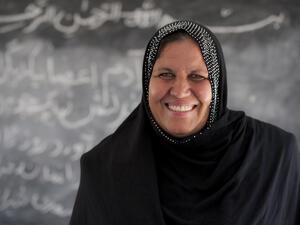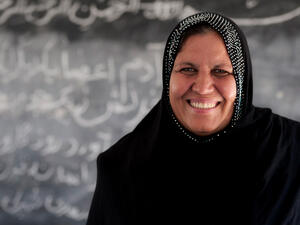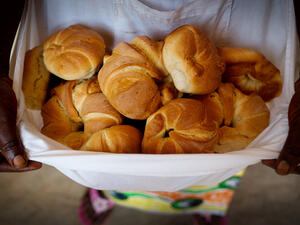Russia's "Memorial" wins 2004 Nansen Refugee Award
Russia's "Memorial" wins 2004 Nansen Refugee Award
30 April 2004
GENEVA - Russia's Memorial Human Rights Centre, a non-governmental organisation that has helped tens of thousands of refugees and internally displaced people across the Russian Federation, has been named this year's Nansen Refugee Award winner.
Announcing the 2004 award on Friday, U.N. High Commissioner for Refugees Ruud Lubbers said that among the Russian Federation's relatively young NGO community, the Moscow-based Memorial Human Rights Centre stands out as a highly respected and effective advocate for the displaced and the dispossessed. He said the Nansen Award Committee was particularly impressed with the wide range of services carried out by the Centre on behalf of forced migrants and internally displaced people as well as refugees from as far afield as Africa, the Middle East and Asia.
The Nansen Refugee Award is given annually to individuals or organisations that have distinguished themselves in work on behalf of refugees.
Memorial Human Rights Centre emerged during the former Soviet Union's "perestroika" period and was formally established in 1987 as a department of the Memorial Society, one of the country's first NGOs. The Centre became independent in 1993, with a mandate to monitor and report on the human rights situation in Russia and across the former USSR. The scope of its activities rapidly evolved amid an influx of millions of forced migrants from the Commonwealth of Independent States and Baltic countries, as well as displacement from the Chechnya conflict. Gradually, it also gained expertise in providing help to thousands of refugees from the so-called "far abroad."
"Today, Memorial Human Rights Centre's network of some 150 dedicated staff work in more than 45 regions across the Russian Federation," High Commissioner Lubbers said. "Last year, it provided legal counselling to more than 21,300 people, including forced migrants, internally displaced people and asylum seekers. Many were from non-CIS countries. It has carried out its work in often very difficult situations - including in the North Caucasus - and has earned the respect of all of us in the international humanitarian community."
The Memorial Centre was instrumental in several landmark Russian court decisions involving issues ranging from citizenship and residence permits to compensation for internally displaced people. In 2002, it sought an amendment to Russia's new citizenship law and succeeded the following year.
In Moscow, Memorial Human Rights Centre Council member Svetlana Gannushkina welcomed the global recognition brought by the Nansen Refugee Award. Ms. Gannushkina said the award was "an expression of solidarity on the part of the international community," and noted the strong links between her organisation and UNHCR.
The Nansen Refugee Award, named after Fridtjof Nansen - Norwegian polar explorer and the world's first international refugee official - was created in 1954. Previous recipients include Eleanor Roosevelt, King Juan Carlos I of Spain, Queen Juliana of the Netherlands, Médecins Sans Frontières, the late Tanzanian President Mwalimu Julius Nyerere, the people of Canada, Graça Machel and Italian tenor Luciano Pavarotti.
The award includes $100,000 for a refugee project of the recipient's choice and will be formally presented to the Memorial Human Rights Centre on June 20 - World Refugee Day - in Barcelona as part of the Universal Forum of Cultures, Barcelona 2004. The award ceremony will be presided over by Her Royal Highness the Infanta Cristina of Spain, and Spanish actor Imanol Arias will be master of ceremonies for the evening event in Barcelona's Palau de la Música Catalana. UNHCR Goodwill Ambassador Angelina Jolie will also attend as the High Commissioner's guest of honour.
The winner of the 2003 Nansen award, Italian humanitarian Dr. Annalena Tonelli, was shot and killed outside her hospital in Borama, North-West Somalia, in October, 2003. Since then, her beloved hospital has continued to operate through the efforts of the national staff and funding from her family and friends in her hometown of Forli, Italy. The United Nations Country Team for Somalia has also given technical assistance. UNHCR, for example, built a laundry, kitchen and other buildings for the hospital.
"The Nansen award has helped make it possible for the hospital to continue its important work," said Simone Wolken, UNHCR Representative for Somalia, and the person who nominated Dr. Tonelli for the award last year.







